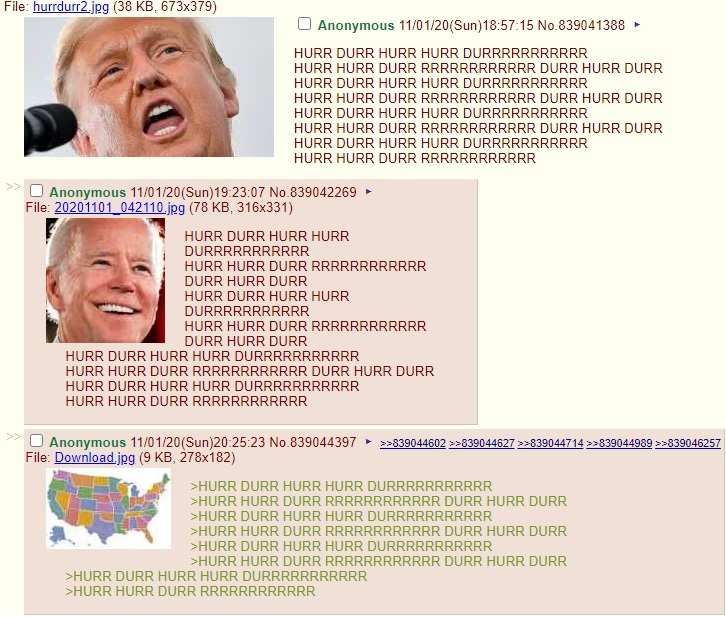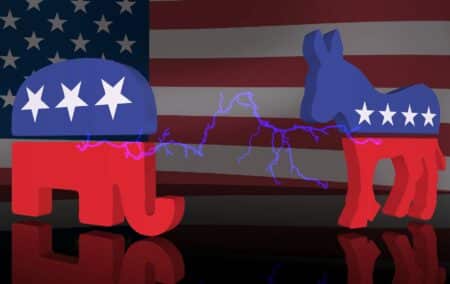Another American election day dawns, pitting the two-party state’s worst candidates against each other. What the US needs is neither Biden, nor Trump, but ranked voting.
Four years ago, a month before the unexpected victory of Donald Trump in the 2016 US elections, I wrote a column in which I described his rival, Hillary Clinton as ‘the lesser of two evils’.
Never mind the illiberal, even socialist, leanings of the Democratic Party. Clinton herself had an awful record of callous warmongering, cronyist corruption, and laughing about how she got a guy who raped a 12-year-old girl off with time served.
In that column, I described myself as an opponent of Trump, and I still am. I wrote:
‘Nobody who has followed his career and personal life has ever accused him of class. …
‘He has no policy positions that are both consistent and realistic, but he panders to protectionism and xenophobia, neither of which are liberal ideals. Neither position will benefit the rest of the world.
‘He shoots from the hip, making it up as he goes along. This may be a refreshing change from the staid rhetoric of experienced politicians, but it does not fill one with confidence in the man’s ability to act responsibly as leader of the free world.’
My views on his opponent weren’t any more flattering, however:
Hillary Clinton represents the powerful and the rich. Her rhetoric, of course, would deny this, much like billionaire tycoon Donald Trump claims to represent the working class. But her record speaks volumes. She’s a consummate politician, with all that species’ worst characteristics: mendacity, hypocrisy, corruption, and a skin of Teflon to which no scandal appears to stick.
Wrong-think
When Trump unexpectedly defeated Clinton, I wrote another column. In it, I took immoderate pleasure in her defeat, saying ‘the tears of the left taste delicious’, although I was careful to note I took no pleasure in Trump’s victory. Both promised to be divisive and hateful, with Clinton describing Trump’s supporters as a ‘basket of deplorables’.
I wrote:
‘Insults will never convince people to see things your way, and neither will tarring half the population with the same brush. The left has been so blinded by the certainty that it is right, that it utterly rejected the very real concerns of its political opponents.
‘As a libertarian, I do not like the fact that Donald Trump won the election, since he is an authoritarian who promises tax-funded public works projects and opposes free trade and free movement of people. But I am delighted that Hillary Clinton lost. She and her supporters had it coming, and it had nothing whatsoever to do with her gender.
‘The electorate rejected her as the embodiment of the status quo of cronyism, corruption, environmental catastrophism and warmongering.’
Unfortunately, that column was never published. My editor at Daily Maverick declined it, because rejoicing about Hillary’s defeat, even without giving support to Trump, was wrong-think. Also, I poked fun at the overwrought media reactions to the election outcome, so perhaps he felt a little sensitive about publishing some of those.
I believe my initial assessment of Trump aged well. He turned out to be just as uncouth, dishonest, and impetuous as expected, and appealed to base instincts of nationalism, xenophobia, and even outright racism. As a libertarian, I approve of his campaign to tear down regulatory red tape, his hostility to political correctness, and his peace deals in the Middle East, but there is little else worth celebrating from his first four years, and he has trampled on a great many cherished ideals of classical liberalism.
Here we are again
Yet here we are again, this time with Barack Obama’s vice president instead of his secretary of state, in opposition to Trump.
Joe Biden is a better option that Trump, in some respects. Any classical liberal should appreciate his socially liberal positions on issues such as equal rights. The Economist makes a good case that he would restore some dignity, civility, and decency to America’s highest office, if only because he is a grey, unremarkable, frumpy career politician who won’t do anything unorthodox.
Yet he represents the same old-school Democratic establishment that Clinton represented, with all its warmongering, elitism, corruption, and environmental doom-mongering.
Although he is economically moderate for a Democrat, he has already made concessions to his party’s resurgent far-left wing, with its penchant for Green New Deals, racist ‘anti-racism’, fascist ‘anti-fascism,’ and outright socialist economics. He will likely have to make more.
He is old. Very old. The median age at which previous American presidents assumed office is 55. The oldest president ever to assume office was Trump, aged 70. The oldest president ever at the end of his term was Ronald Reagan, at 77.
Joe Biden turns 78 this month. He will be the oldest US president inaugurated for the first time by eight years. If he lives, he will be America’s first octogenarian president. Only 14 of America’s 45 presidents to date even lived to 78, and only 11 made it to 80.
He often seems confused or disoriented while speaking, and already has a reputation for political gaffes. And it isn’t just his age. He has always been a terrible politician. It is also hard to see how his creepy habit of touching women and girls inappropriately is much of an improvement on Trump’s overt sexist machismo.
Whoever wins, there is no chance that the US government will get smaller, that monetary stimulus will end, that free trade will triumph, or that individual rights will trump identity politics.
Once again, the choice seems to be between Dumb and Dumber. Perhaps 4chan users said it best:

Electing lizards
In my 2016 pre-election column, I quoted a passage from So Long and Thanks for All the Fish, the last book in the Hitchhiker’s Guide to the Galaxy series by the late Douglas Adams, in which the protagonist, Arthur Dent, and his alien guide, Ford Prefect, encounter a flying saucer from which a 100-foot tall silver robot emerged:
‘“I come in peace,” it said, … “take me to your Lizard.”
‘Ford Prefect, of course, had an explanation for this… “It comes from a very ancient democracy, you see …”
‘“You mean, it comes from a world of lizards?”
‘“No,” said Ford…, “nothing so simple. Nothing anything like so straightforward. On its world, the people are people. The leaders are lizards. The people hate the lizards and the lizards rule the people.”
‘“Odd,” said Arthur, “I thought you said it was a democracy.”
‘“I did,” said Ford. “It is.”
‘“So,” said Arthur, hoping he wasn’t sounding ridiculously obtuse, “why don’t people get rid of the lizards?”
‘“It honestly doesn’t occur to them,” said Ford. “They’ve all got the vote, so they all pretty much assume that the government they’ve voted in more or less approximates to the government they want.”
‘“You mean they actually vote for the lizards?”
‘“Oh yes,” said Ford with a shrug, “of course.”
‘“But,” said Arthur, going for the big one again, “why?”
‘“Because if they didn’t vote for a lizard,” said Ford, “the wrong lizard might get in. … Some people say that the lizards are the best thing that ever happened to them,” he said. “They’re completely wrong of course, completely and utterly wrong, but someone’s got to say it.”
‘“But that’s terrible,” said Arthur.’
Once again, this passage seems appropriate. America, for so long a bastion of liberal democracy, is burdened with a succession of terrible leaders, drawn from two staid establishment parties that duopolise its political system. Not since Reagan have I thought a US president was half-decent at the job.
It’s almost as if the system is designed to produce the worst candidates, election after election, without letting anyone with fresh ideas compete. And it is. A first-past-the-post system run the way it is in America is guaranteed to produce two dominant parties continually duelling over a small number of swing voters.
While this has the advantage of being able to hold one party accountable by kicking them out and installing the other party, it has the great disadvantage that neither party needs to be very responsive to the real concerns of voters. They don’t need to be very good. They merely need to be better than the opposition, and that bar is getting lower and lower with every passing election.
Every year, we wonder why Americans don’t just ditch the establishment candidates and vote for a Green Party or Libertarian Party candidate instead. This year, Jo Jorgensen would be so much better than either Trump or Biden, but the chance she’ll get elected is zero.
Ranked voting
But there is an alternative. Maine has just become the first US state to use ranked voting in the federal election.
Ranked voting is a little more complicated than simple first-past-the-post voting, but it removes a huge hurdle to third-party participation in the election.
In 1992, Ross Perot ran as an independent third-party candidate against the incumbent, Republican, George H.W. Bush, and the Democrat, Bill Clinton. Although he won no electoral college votes he received 18.9% of the vote, the most by any candidate that was not from one of the two establishment parties since Teddy Roosevelt won 27% of the vote on a Progressive (or ‘Bull Moose’) ticket in 1912. In 1992 Clinton won the presidency with only 42% of the popular vote. If Perot hadn’t run, however, most of his votes would probably have gone to Bush, which likely would have got him re-elected.
Ralph Nader, another third-party candidate, but with far more left-wing views, has run for president four times. In 2000, he was widely blamed for tipping the election in favour of Republican, George W. Bush and against Democrat, Al Gore.
These are called ‘spoiler candidates’. Most people who voted for Perot would have preferred Bush Sr. to Clinton, while most people who voted for Nader would have preferred Gore to Bush Jr. By voting for the spoiler candidate, they ensured only that their least favoured candidate won.
This discourages most voters from voting for a third-party candidate, no matter how appealing their platform might be. Environmentalist voters want a Green New Deal within the Democratic Party, because nobody will risk voting for a Green Party candidate and gifting an election to the GOP. Conversely, libertarian voters want libertarians to run within the GOP, because voting for the Libertarian Party might gift the election to the Democrats.
Ranked voting prevents this problem. By listing candidates in order of preference, voters whose preferred candidates lose get a second bite at the cherry, so to speak.
If, on first-choice voting, a candidate gets an outright majority, they win. If nobody wins a first-choice majority, the worst-performing candidate gets eliminated, and their votes get transferred to their voters’ next choice, if they’ve indicated one. Rinse, repeat, until a candidate emerges with a majority.
This way, a vote for an outsider does not effectively become a vote for one’s least-favoured candidate.
Ranked voting might very well be the solution to the electoral dominance of the Republicans and Democrats in the US. It could go a long way towards overthrowing the idiocracy its electoral system has produced. The sooner other US states adopt ranked choice voting, the better.
I don’t know which way today’s election will turn out. I don’t even know which way I want it to turn out. Once again, justice would be served if both lizards lose.
Image by chayka1270 from Pixabay
The views of the writer are not necessarily the views of the Daily Friend or the IRR
If you like what you have just read, support the Daily Friend

